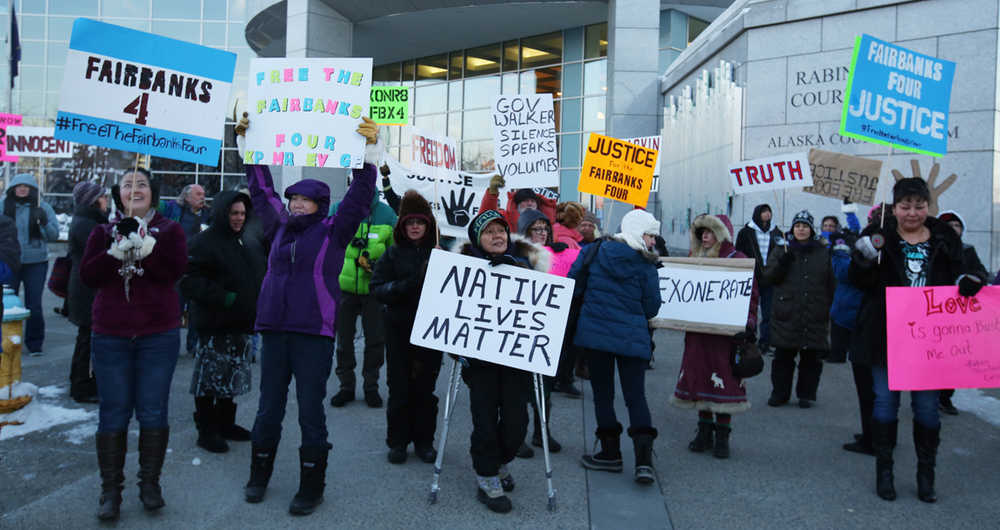ANCHORAGE — Alaska Gov. Bill Walker is considering whether to grant pardons or clemency to four indigenous men convicted In the 1997 death of a Fairbanks teenager, his office said Friday.
Walker’s deliberations highlight a busy week in the case against the so-called Fairbanks Four, three Alaska Native men and an American Indian who have always maintained their innocence in the death of 15-year-old John Hartman. The men are seeking to have their convictions overturned, and a judge is expected to make a decision next year.
Walker spokeswoman Grace Jang didn’t have immediate word Friday on whether Walker had made a decision in the case.
The state continues to vigorously defend the convictions, but it made a surprise offer this week to free the three remaining jailed men. In exchange, all four men — including one released on parole earlier this year — would not be allowed to sue government entities. The men also would have to withdraw their claims of innocence. The state also said if new evidence came to light, the men would be prosecuted again.
Superior Court Judge Paul Lyle canceled a Friday hearing over the deal, saying it wasn’t clear to him that he had the authority to free the men after prosecutors neither pardoned them nor offered clemency.
“Trial judges have no desire to stand in the way of lawful settlements,” Lyle wrote in a four-page order on Thursday vacating the hearing. “However, the undersigned is unaware of the legal authority that would permit the immediate release of petitioners who have withdrawn their claims of innocence while the State continues to assert the validity of their convictions.”
Lyle ordered the two sides to file a joint brief within 10 days outlining how he would have the legal authority to allow the agreement as written. The judge said the parties could instead choose to modify the proposal in a way that would let the court act immediately. Lyle also noted in his order that the state is free to grant pardons or clemency.
The proposed deal is highly unusual, said Heidi Rummel, a law professor at the University of Southern California Gould School of Law’s post-conviction justice project.
Rummel said she didn’t know of any similar deal, saying it would be much more typical for judges to consider agreements where the government requests original convictions be vacated in exchange for pleas to lesser charges, with defendants freed on time served. But in the Fairbanks case, she said, the men are serving sentences that have been imposed and neither a judge nor the state has the authority to release them.
“Honestly, it’s like the state is trying to have its cake and eat it, too,” Rummel said.
Two of the men are represented by Bill Oberly with the Alaska Innocence Project. Oberly took up the case several years ago and filed a civil action for post-conviction relief after obtaining a confession from a former Fairbanks man serving time in a California prison who claimed he was with a group of other men who killed Hartman.
Oberly said Friday he could not discuss the ongoing negotiations with the state nor which direction any agreement is headed.
“Our guys maintain their innocence and always have and always will,” he said, declining to explain how that stance fits in with the proposed deal that would require the men to stop claiming their innocence.
Officials with the state Department of Law late Friday released copies of the proposed deal, saying it had been filed Friday in court.
“The parties have entered into an agreement to bring an end to this litigation and allow the community of Fairbanks to begin the healing process,” department spokeswoman Kaci Schroeder said in an email, noting the court is asking for the additional brief on the legal issue. “The Department of Law will offer no further comment while it awaits the court’s ruling.”
Asked if the filing changed anything, Schroeder said by email that it did not. “We are still waiting for the court’s ruling,” she wrote.
Supporters of the men rallied outside the Fairbanks courthouse Friday, with some urging Walker to grant pardons or clemency, the Fairbanks Daily News-Miner reported. Some said they were wary of any agreement that precluded lawsuits and did not outright exonerate the men. Many Alaskan Natives say the men were wrongly accused because of racial prejudice.
“Our boys are still innocent,” Mona Nollner, the stepmother of one of the men, told the Fairbanks newspaper. “And they shouldn’t have to sign something that says they won’t sue the state for 18 years of being wrongfully convicted, 18 years away from their families.”

